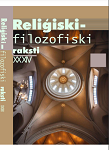NO ROMANTISMA PIE MAKSA PLANKA, JAKOBA FON IKSKILA UN JOZEFA NĀDLERA: DABA, RELIĢIJA UN KULTŪRKRITIKA 20. GADSIMTA 20.–30. GADU ZINĀTNĒS UN HERDERA INSTITŪTĀ RĪGĀ
FROM ROMANTICISM TO MAX PLANCK, JAKOB VON UEXKÜLL AND JOSEF NADLER: NATURE, RELIGION AND KULTURKRITIK IN THE SCIENCES AND AT HERDER-INSTITUTE IN RIGA (20S–30S YEARS OF THE 20TH CENTURY)
Author(s): Raivis Bičevskis:Subject(s): Philosophy of Science, Sociology of Culture, Interwar Period (1920 - 1939), Sociology of Religion
Published by: Latvijas Universitātes Filozofijas un socioloģijas institūts
Keywords: Max Planck; Jakob J. von Uexküll; Josef Nadler; Ludwig Klages; science; Kulturkritik; nature; religion; Herder Institute in Riga;
Summary/Abstract: Looking at the expansive and intensive development of modern science in the second half of the 19th century and the first decades of the 20th century, it is also surprising that accumulating a massive amount of empirical material and research results and searching for a theoretical basis and interpretive framework, science engages in culturally critical worldview and ideological discussions. Science is far from “neutral”; despite self-reflexive efforts, it keeps falling into the trap of socio-political and ideological-cultural-political obsessions. It has not been protected from them by the frame of “rationalisation” (Max Weber) of the general modern reality. On the contrary, it has become an ambivalent condition for the ideologization of science. Even the critical theory’s view of “science as an ideology” ( J. Habermas) in the conditions of changed socioeconomic relations of modernity, reflections on science as “social reality,” a critical question about “to what extent the concept of science constitutes reality” and the recognition that “science becomes problematic as a type of knowledge” (G. Böhme). Within the framework of this article, attention is paid to the involvement of science in culturally critical worldview and ideological discussions in a particular aspect of the history of education and science in Latvia: looking at the activities of the Herder Institute in Riga and the discourses brought to Riga by the institute’s guests – prominent scientists and philosophers of their time. During its existence (1921-1939), the Herder Institute was visited by a large number of teaching staff and visiting lecturers of the so-called university holiday courses. From all these cases, within the framework of the article, attention is paid to those in which the contact between the fields of science and worldview, science and cultural criticism is clearly visible, i.e., in which the production of worldview and culture-critical discourses within the framework of an academic-scientific framework is evident – at the meeting points of “nature,” “life” and religious ideas. Moreover, the selected cases – Max Planck, Jakob von Uexküll, Josef Nadler – are significant for constellating philosophical and worldview ideas and scientific discourses of modernity during the years 20-30 of the 20th century. The context of the Herder Institute’s activities, in which the discussed discourses appear, is first outlined in the article. Next, attention is paid to the statements of particular scientists and philosophers (Planck, von Uexkuüll) regarding nature, life, and religion and their context. Finally, it is shown that the worldview discourse boundaries do not coincide with the boundaries of science groups (natural sciences, cultural sciences); the discourses that exist at that time (or are supplemented or even discursively innovatively turned) are broader than the frameworks of the scientific fields represented by the authors (Klages, Nadler) and are part of the ambivalent struggle of the modernity of that time for the future.
Journal: Religiski-filozofiski raksti
- Issue Year: XXXIV/2023
- Issue No: 1
- Page Range: 101-133
- Page Count: 33
- Language: Latvian

